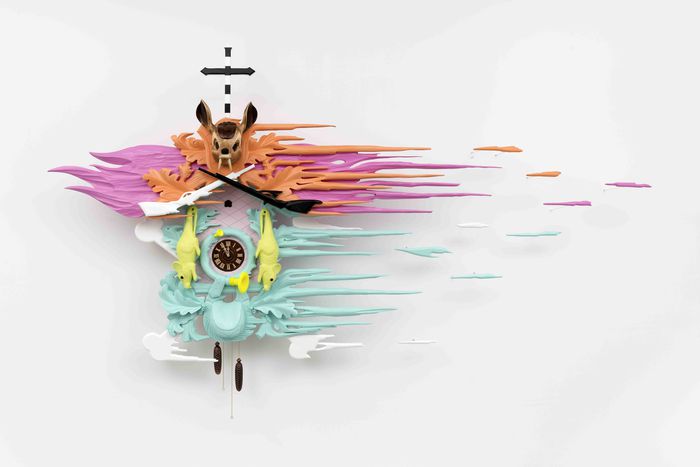
Stefan Strumbel: Heimat is where your heart is
Published on
Translation by:
CafébabelIn his series of sculptures and artistic installations, German artist Stefan Strumbel takes as his subject Heimat, a continually recurring notion in Germany. It refers to the place and state of mind that we associate with home. What does this mean for refugees coming to Europe? Can a Heimat also be a hostile place?
cafébabel: So Stefan, to quote the name of your exhibition, what the fuck is Heimat?
Stefan Strumbel: It's a big question for me because Heimat is a feeling. It has always appeared to be strongly related to the Black Forest (or Schwarzwald in German). The word was already appearing in 1833 in a dictionary by the Brothers Grimm. The first big motion pictures in Germany – like Schwarzwaldmädel – were Heimat films. That movie generated so much publicity [for the region of the Black Forest] that afterwards people thought that Heimat was solely a Black Forest phenomenon, and that it only consisted of a good side.
However, Heimat exists everywhere in the world; everybody needs that feeling of love and warmth. Even if you can translate the word Heimat into English, you cannot translate this feeling. Once I had an exhibition in the USA called "Deine Heimat" (Your Heimat) and everybody was asking me: "What the fuck is Heimat?" That’s the origin of the question.
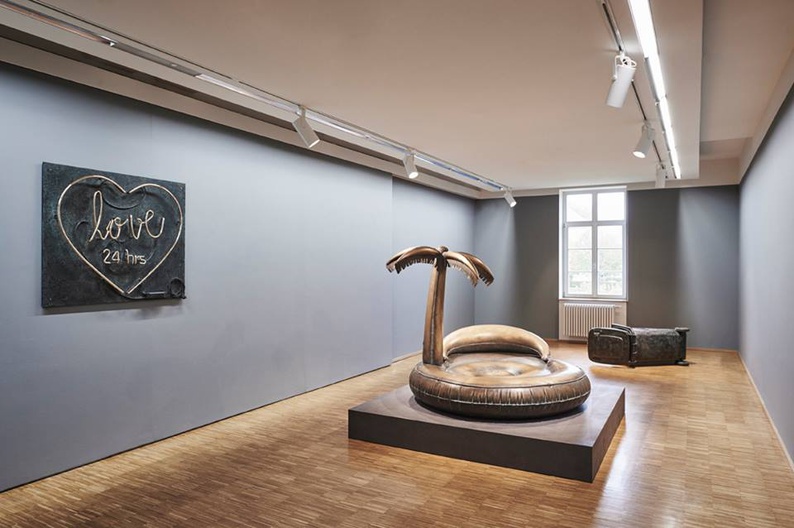 cafébabel: So is Heimat inherently a good thing? It's a happy place?
cafébabel: So is Heimat inherently a good thing? It's a happy place?
Stefan Strumbel: In terms of my art, and myself, yes! However, Heimat can also include the bad sides of life. For example the situation of 60 million refugees at the moment – they have to leave their countries and their homes and they are hoping to be able to create a new Heimat in a new land.
In my exhibition you can see a bronze inflatable island with a palm tree. You can use it to float on water. This is an island from my childhood; I used to float on it with my father and mother during the holidays. Back then I felt safe and happy with my family. Today, some refugee kids travel on similar inflatable boats to their deaths. Heimat will mean a different thing for everybody.
cafébabel: The artworks in the exhibition are sometimes contradictory. One trend replaces the original elements of cuckoo clocks with motifs associated with violence, pornography and death. Why is this?
Stefan Strumbel: I am breaking existing conventions to find something new. When you google Heimat one of the things you can find is pictures of cuckoo clocks. It's a very iconic part of Heimat. I transform the tradition and make something new to provoke people into thinking about what Heimat really is. Normally, nobody gives cuckoo clocks a second thought. Everybody knows them. When we embellish them with violence, pornography and stark colours, people wake up and start revising their notions.
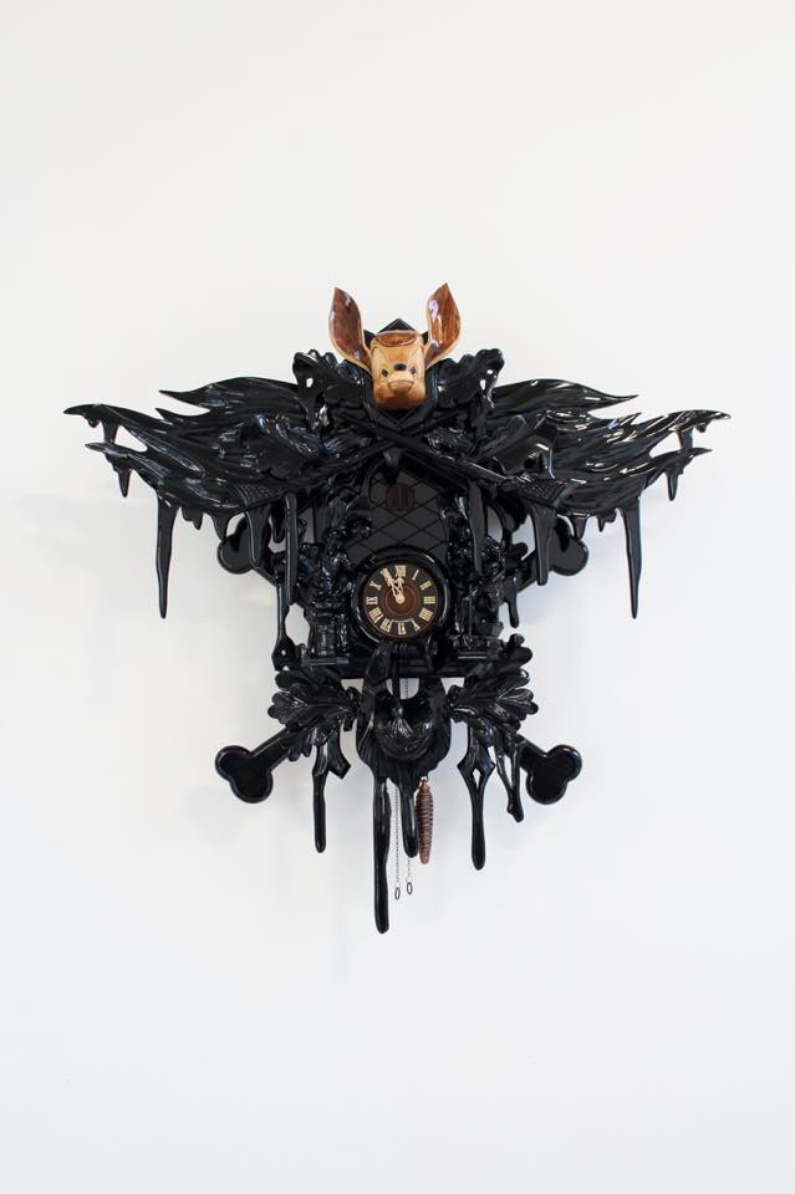 cafébabel: In your exhibition you also included some petrified models of takeaway fast food. Is Heimat thus associated with consumerism?
cafébabel: In your exhibition you also included some petrified models of takeaway fast food. Is Heimat thus associated with consumerism?
Stefan Strumbel: Yes and no, because you cannot buy Heimat and pay for it with money. Of course, Heimat is also related to the traditional food of a certain region. By contrast fast food is an empty significant because it tastes the same everywhere in the world.
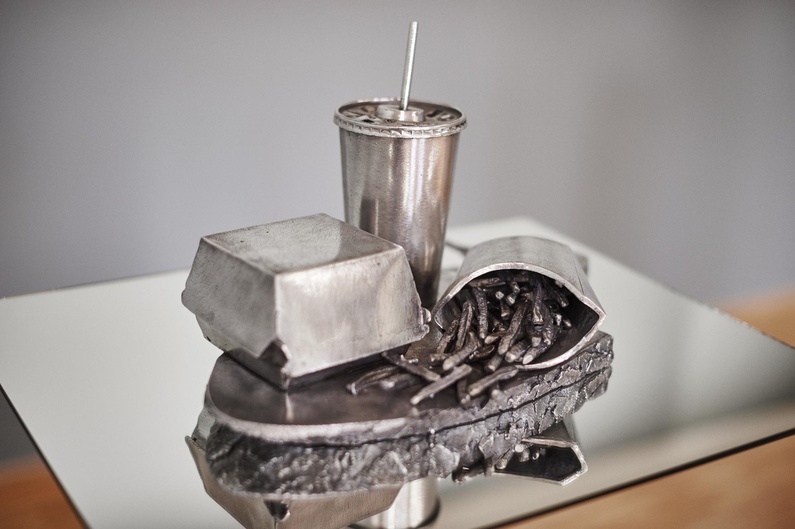 cafébabel: What is the story behind the series?
cafébabel: What is the story behind the series?
Stefan Strumbel: As an artist, I started with graffiti. Whilst I was spraying I was creating an area within which I felt good. I made it colourful. I made it mine. Then, I started travelling and people used to say: you're from the Black Forest, the Heimat place that Bambi comes from, where everything is easy. I used to say: "Come on, no. Heimat is everywhere."
Then I started to do exhibitions worldwide, in countries that don’t have a word for Heimat. I want to spread the feeling and the message that was born here in Germany in a new, exclusively positive way. I wanted to present Heimat as an open place for everybody, to welcome them with love.
cafébabel: Is Offenburg your Heimat?
Stefan Strumbel: Offenburg is the place where I have my roots, and my family and friends. I live here, I have a son here, I feel at home here: these are the most important things. But I also feel Heimat when I go to Hamburg or Berlin with good friends. It appears when I go to a hotel and it smells like my grandma’s house.
cafébabel: One of the objects exhibited in Heimat is a large wastebin. What does this represent?
Stefan Strumbel: It's a symbol of consumption. In our world everything is fast and we throw everything away – relationships, goods, e-mails... You have to think about what you throw away, because if you don't you lose connection to it – you lose your footing and fall to the ground.
cafébabel: You mean, the things that one throws away are parts of your identity as well?
Stefan Strumbel: Not only your identity, but also your feelings, family and deeper meaning of life. Because we throw everything away, we don’t build close relationships to people or things. It’s much easier to find new friends than to talk things over with them or to buy something new instead to fix the old thing.
cafébabel: Is the notion of Heimat potentially dangerous? It was eagerly used by the Nazis in nationalistic and xenophobic discourse. Do you think that the right-wing parties on the rise in today’s Europe play the same game, making people believe that the European Heimat is in danger from immigration? (For example this slogan used by Alternative for Germany: "Rettet unsere Heimat", or Save our Heimat. ed.)
I fight against a negative perception of Heimat. I have chosen Heimat as a subject because it's symbolic of the Black Forest region and because of the term's popularity now. I concentrate on its positive implications.
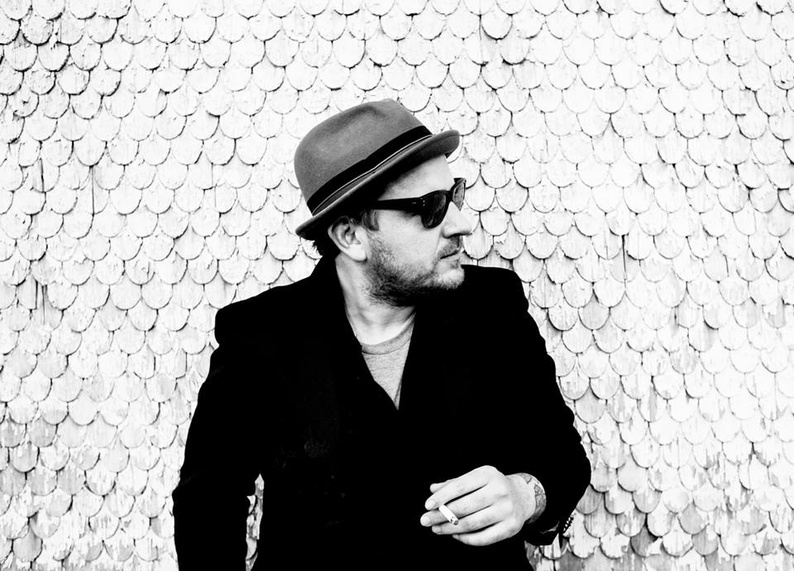 cafébabel: Can we create a Heimat for others? Thinking of, for example, refugees in Europe.
cafébabel: Can we create a Heimat for others? Thinking of, for example, refugees in Europe.
Yes, we must help them create their Heimat. Everybody has to have it, because it’s the guarantee of happiness. Heimat is a feeling that we all love. This love however is not about passion to the extent that it is about being safe and warm.
Can Heimat be limiting? If we compare it to a comfort zone, warm and cosy, can we also assume that might make us lazy and hinder our personal development?
Yes, it can do, but it doesn’t have to. You can be open for new things without forgetting your roots. Previous generations, old traditions... You can carry over the positive aspects.
---
More images of works from the "Heimat" series can be found here.
---
This article forms part of our special end of year dossier for 2015, this year themed around the notion of 'Home'.
Translated from Stefan Strumbel: Heimat jest tam, gdzie twoje serce



